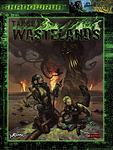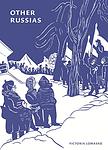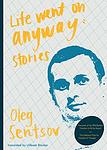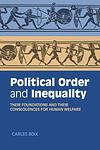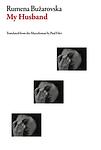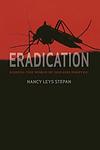The Greatest Russian, Unknown Books Since 2010
Click to learn how this list is calculated.
This list represents a comprehensive and trusted collection of the greatest books. Developed through a specialized algorithm, it brings together 300 'best of' book lists to form a definitive guide to the world's most acclaimed books. For those interested in how these books are chosen, additional details can be found on the rankings page.
Genres
Countries
Date Range
Reading Statistics
Click the button below to see how many of these books you've read!
Download
If you're interested in downloading this list as a CSV file for use in a spreadsheet application, you can easily do so by clicking the button below. Please note that to ensure a manageable file size and faster download, the CSV will include details for only the first 500 books.
Download-
1. Feed by Seanan McGuire
In a world where humanity has been ravaged by a zombie apocalypse, a team of bloggers sets out to cover the presidential elections, offering a unique perspective on the state of a society where the undead are a constant threat. The protagonist, a young woman with a passion for the truth, navigates a landscape of danger, political intrigue, and conspiracy, all while dealing with the challenges of living in a post-apocalyptic environment. As they delve deeper into the heart of America's reanimated politics, they uncover a plot that could have dire consequences for both the living and the undead, forcing them to confront the question of what it truly means to be human in a world overrun by zombies.
-
2. Target Land by Svoboda Bachvarova
"Target Land" is a gripping novel that delves into the complexities of human relationships and the psychological impacts of trauma. Set against the backdrop of a society grappling with the aftermath of a devastating event, the narrative follows the journey of a protagonist who must navigate a world filled with uncertainty, danger, and moral ambiguity. As the character is drawn into a web of intrigue and conspiracy, they are forced to confront their own past and the haunting memories that shape their present. The story weaves together themes of survival, identity, and the quest for redemption, culminating in a poignant exploration of the resilience of the human spirit.
-
3. Penpal by Dathan Kahn Auerbach
"Penpal" by Dathan Kahn Auerbach is a chilling and suspenseful novel that follows a man's investigation into a series of unsettling events from his childhood. As he delves into his past, he uncovers a dark and disturbing secret that connects him to a mysterious figure who has been stalking him throughout his life. With each revelation, the protagonist becomes increasingly haunted by his past, leading to a gripping and unnerving climax.
-
4. Carbide by Andriy Lyubka
In this thought-provoking novel, "Carbide" explores the complex dynamics of power, corruption, and the human condition. Set in a dystopian society, the story follows a young protagonist who becomes entangled in a dangerous game of political intrigue. As he navigates through the treacherous landscape, he discovers shocking truths about the ruling elite and the lengths they will go to maintain their control. With its compelling narrative and vivid imagery, "Carbide" delves into the dark underbelly of society, challenging readers to question their own beliefs and the nature of power.
-
5. Gideon The Ninth by Tamsyn Muir
In a universe where necromancers hold power, Gideon, a skilled swordswoman, is reluctantly paired with her childhood rival, Harrow, to compete in a deadly trial that could grant them immortality. As they venture into an ancient, decaying mansion filled with secrets and puzzles, they must unravel the mysteries of their world and face sinister forces lurking within. With a blend of dark humor, complex characters, and a gripping plot, "Gideon The Ninth" is a thrilling and unique blend of science fiction and fantasy.
-
6. The Mountain And The Wall by Alisa Ganieva
"The Mountain and the Wall" is a thought-provoking novel set in a fictional region of Russia, where a massive wall is being constructed to separate the Muslim population from the rest of the country. Through the eyes of various characters, the book explores the impact of this division on individuals and communities, delving into themes of identity, religion, and the struggle for freedom. As tensions rise and conflicts erupt, the story highlights the complexities of human relationships in a divided society.
-
7. Zuleikha by Guzel Yakhina
"Zuleikha" is a captivating historical novel set in 1930s Soviet Union, following the life of Zuleikha, a Tatar woman who is forcefully taken from her home and exiled to Siberia. As she struggles to adapt to the harsh conditions of the remote village, Zuleikha finds solace in her resilience and the unexpected connections she forms with her fellow exiles. Through her journey of survival, love, and self-discovery, Zuleikha's story beautifully explores themes of identity, freedom, and the indomitable human spirit.
-
8. The Natashas by Yelena Moskovich
"The Natashas" is a haunting and lyrical novel that weaves together the stories of three women: a young Russian prostitute searching for freedom, a French actress escaping her troubled past, and an American student seeking connection. Set against the backdrop of Paris, the book explores themes of identity, displacement, and the lengths people go to find themselves and their place in the world.
-
9. The Diary Of A Gulag Prison Guard 1935 6 by Ivan Chistyakov
"The Diary Of A Gulag Prison Guard 1935-6" is a chilling and harrowing memoir that provides a firsthand account of the atrocities and cruelty witnessed by Ivan Chistyakov during his time as a guard in a Soviet Gulag prison. Through his detailed entries, Chistyakov reveals the dehumanizing conditions, brutal punishments, and constant fear that both prisoners and guards endured within the oppressive Soviet regime. This haunting narrative serves as a stark reminder of the dark realities of the Gulag system and the lasting impact it had on the lives of countless individuals.
-
10. Other Russias by Victoria Lomasko
"Other Russias" is a powerful and thought-provoking graphic novel that offers an intimate and unfiltered glimpse into the lives of marginalized individuals and communities in contemporary Russia. Through her stunning illustrations and poignant interviews, Victoria Lomasko sheds light on the struggles, hopes, and resilience of diverse groups such as LGBTQ+ activists, migrant workers, political dissidents, and the forgotten voices of rural communities. This eye-opening book challenges stereotypes and provides a humanizing portrayal of those who are often overlooked or silenced in Russian society.
-
11. An Immense World by Ed Yong
"An Immense World" is a collection of science essays written by Ed Yong, a science journalist. The book explores a wide range of scientific topics, from the behavior of animals to the complexities of the human microbiome. Yong's writing is accessible and engaging, making complex scientific concepts easy to understand for readers of all backgrounds. The essays are thought-provoking and provide a glimpse into the fascinating world of science. Overall, "An Immense World" is a must-read for anyone interested in science and the natural world.
-
12. Of Strangers And Bees by Hamid Ismailov
"Of Strangers And Bees" is a captivating novel that delves into the life of a young woman named Nafisa, who finds herself torn between her traditional Uzbek upbringing and her desire for independence and self-discovery. Set against the backdrop of the Soviet Union's collapse, Nafisa's journey takes her through a series of encounters with strangers who challenge her perceptions and push her to question societal norms. With lyrical prose and vivid storytelling, the book explores themes of identity, love, and the complexities of navigating a rapidly changing world.
-
13. Life Went On Anyway by Oleg Sentsov
"Life Went On Anyway" is a powerful memoir that chronicles the life of Oleg Sentsov, a Ukrainian filmmaker who was wrongfully imprisoned by the Russian government. Through his vivid and poignant storytelling, Sentsov shares the harrowing details of his arrest, imprisonment, and the relentless fight for justice. Despite the unimaginable hardships he endures, Sentsov's resilient spirit shines through as he reflects on the power of art, the importance of freedom, and the indomitable human will to survive.
-
14. Rock, Paper, Scissors And Other Stories by Maxim Osipov
"Rock, Paper, Scissors And Other Stories" is a collection of captivating short stories that delve into the lives of ordinary people in a small Russian town. Through these interconnected tales, the author explores themes of love, loss, and the complexities of human relationships. With a keen eye for detail and a deep understanding of the human condition, the stories in this book offer a poignant and thought-provoking glimpse into the lives of individuals navigating the challenges of modern-day Russia.
-
15. Political Order And Inequality by Carles Boix
This book delves into the intricate relationship between political dynamics and social inequalities, offering a comprehensive analysis of how political institutions shape economic disparities and vice versa. The author argues that the formation of political order and the distribution of resources within a society are deeply interconnected processes, influenced by historical events, economic pressures, and power struggles. Through a detailed examination of various political systems and historical contexts, the book presents a theoretical framework for understanding the mechanisms through which political stability and inequality are mutually reinforced, suggesting that the path to a more equitable society lies in the careful restructuring of political institutions to address the root causes of inequality.
-
16. My Husband by Rumena Bužarovska
"My Husband" by Rumena Bužarovska is a collection of short stories that explores the complexities of relationships and the struggles of women in contemporary society. Through vivid and thought-provoking narratives, the book delves into themes of love, marriage, infidelity, and the challenges faced by women in a patriarchal society. With a sharp and insightful writing style, the author presents a nuanced portrayal of the human experience, capturing the intricacies of emotions and the often hidden desires and frustrations that shape our lives.
-
17. Russia Is Burning: Poems Of The Great Patriotic War by Maria Bloshteyn
"Russia Is Burning: Poems Of The Great Patriotic War" is a poignant collection of poems that captures the raw emotions and experiences of the Russian people during World War II. Through powerful and vivid imagery, the author delves into the devastating impact of the war on both soldiers and civilians, painting a haunting portrait of loss, resilience, and the indomitable spirit of the Russian people in the face of unimaginable suffering.
-
18. F Letter: New Russian Feminist Poetry by Galina Rymbu, Eugene Ostashevsky, Ainsley Morse
"F Letter: New Russian Feminist Poetry" is a captivating collection of contemporary Russian feminist poetry that challenges societal norms and explores themes of gender, identity, and power. Through the powerful and thought-provoking verses of Galina Rymbu, Eugene Ostashevsky, and Ainsley Morse, this anthology sheds light on the experiences and perspectives of women in Russia, offering a unique and refreshing voice in the world of literature.
-
19. Eradication by Nancy Leys Stepan
This book provides a comprehensive examination of the concept and practice of disease eradication from a historical perspective. It delves into the scientific, ethical, and political dimensions of the global efforts to eliminate diseases, focusing on case studies such as smallpox, malaria, and polio. The narrative critically assesses the successes and failures of these campaigns, highlighting the complexities and challenges involved in attempting to wipe out diseases. Through a detailed analysis, the book explores the implications of eradication efforts on public health policies and practices, questioning the feasibility and desirability of pursuing eradication as a goal in the face of evolving disease dynamics and global health landscapes.
-
20. The History Manifesto by Johanna Hanink
"The History Manifesto" is a thought-provoking exploration into the role of history and historians in addressing the long-term social, political, and environmental challenges facing the world today. It argues for a return to longue durée historical analysis, emphasizing the importance of understanding the deep roots of current issues to inform policy and public debate. The book critiques the trend towards short-termism in both historical research and contemporary policymaking, advocating for a broader, more inclusive approach to history that can offer valuable insights into the complex, interconnected problems of the 21st century. Through its compelling case for the relevance of history in shaping a better future, it challenges historians to think big and reasserts the significance of their work in the public sphere.
-
21. Sustainable Materials by Julian M. Allwood
This book provides a comprehensive exploration into the world of sustainable materials, focusing on the environmental impact of material production and usage. It delves into the science and engineering behind creating materials that are not only durable and functional but also minimize harm to the environment. Through a detailed analysis of various materials, the book offers insights into how industries can shift towards more sustainable practices. It emphasizes the importance of reducing material consumption, recycling, and reusing resources as key strategies for achieving sustainability. The book serves as a crucial resource for engineers, designers, policymakers, and anyone interested in the sustainable development of materials and its significance for the future of the planet.
-
22. The Power Of Horses And Other Stories by Elizabeth Cook
"The Power of Horses and Other Stories" is a collection of short stories that delve into the complexities of human relationships and the poignant moments that shape our lives. The narratives explore a range of themes, including love, loss, and the search for meaning, often through the lens of everyday experiences. With a keen eye for detail and a deep understanding of the human condition, the author weaves tales that resonate with authenticity and emotional depth, inviting readers to reflect on their own journeys and the powerful, sometimes subtle, forces that influence them.
-
23. Jerusalem Plays Hide And Seek by Ariella Deem
"Jerusalem Plays Hide and Seek" is a children's book that takes readers on a whimsical journey through the ancient city of Jerusalem. The story follows a group of friends as they engage in a playful game of hide and seek, exploring the city's historic alleyways, vibrant markets, and sacred sites. Along the way, the children discover the rich cultural and religious tapestry that makes Jerusalem unique, learning about coexistence and the importance of friendship amidst the city's diverse communities. The book combines elements of adventure and education, offering young readers an engaging introduction to one of the world's most storied cities.
-
24. The Bet by Paul Sabin
This book delves into the high-stakes wager between two influential figures, an economist and a biologist, who held opposing views on the future of global resources and population growth. Set against the backdrop of the latter half of the 20th century, the narrative explores the broader debate on environmental policy, economic growth, and the limits of Earth's resources. Through the lens of this famous bet, the author examines the impact of their clash on public discourse and policy, highlighting the complexities of predicting the planet's environmental future. It serves as a fascinating case study on how scientific debates can influence political and public opinion, and the challenges of balancing resource sustainability with human progress.
-
25. The Great Escape by Angus Deaton
This book delves into the historical journey of human progress, particularly focusing on how health and prosperity have evolved over time to create significant disparities in wealth and well-being across different populations. It examines the mechanisms of growth and the spread of prosperity, alongside the challenges and inequalities that have emerged. Through a detailed analysis, the narrative explores the roles of technology, innovation, and government policies in shaping the economic landscapes and the distribution of resources. The author critically addresses the complexities of escaping poverty and the ethical considerations surrounding aid and intervention in less developed economies. The work is a comprehensive exploration of the global patterns of health, wealth, and inequality, offering insights into the potential paths toward a more equitable world.
Reading Statistics
Click the button below to see how many of these books you've read!
Download
If you're interested in downloading this list as a CSV file for use in a spreadsheet application, you can easily do so by clicking the button below. Please note that to ensure a manageable file size and faster download, the CSV will include details for only the first 500 books.
Download
